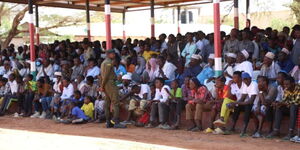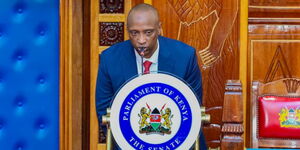Teachers have once again issued a fresh warning to the government over the delays of capitation, saying it seems the government is joking with the education sector.
While insisting that the government must stick to the agreed-upon release of student capitation, the teachers have insisted it is affecting the learning in schools.
“Government, stop joking with our children. Give them money so that learning can continue,” said Hesbon Otieno, Kenya National Union of Teachers (KNUT) Deputy Secretary General.
“Even the assessment fees that they had not included in the budget should be added,” Otieno added.
The union has maintained that the government has yet to clear the funding shortfalls that have been affecting learning in public schools. to cover tuition and operational costs. In 2025,
The disbursement of school capitation is clustered as 50 per cent in the first term, 30 per cent in the second term and 20 per cent in the third term to cover the student the annual allocation of Ksh22,244 per learner.
This funding is earmarked exclusively for tuition-related costs, excluding meals and other essential operational expenses.
By May, schools were still awaiting Ksh2,300 per student from the first term, despite assurances that 50 per cent of the annual capitation would be disbursed at the start of the year.
Additionally, the Kenya Union of Post Primary Education Teachers (KUPPET) reported that only Ksh4,000 per student had been released, far below the required Ksh8,000 for the term. Schools were anticipating 50 per cent for this term, amounting to Ksh28 billion, but only Ksh14 billion had been made available.
“Capitation is trickling in little by little,” asserted Joseph Langat, KNUT Deputy Chairman.
In response to mounting pressure, the government announced the release of Ksh22 billion in capitation funds for Term 2 in May.
Education Cabinet Secretary Julius Ogamba stated that this allocation would support learners in all public basic education institutions, with specific amounts designated for Free Primary Education, Free Day Junior School Education, Special Needs Education in Junior Schools, and Free Day Secondary Education.
However, school heads have expressed concerns that the funds are still insufficient and that delays have already caused significant disruptions.
The Kenya Secondary Schools Heads Association (KESSHA) warned that if funds are not released promptly, schools may be forced to send learners home, risking widespread disruption of the academic calendar.
The teachers are yet to issue any strike threats but are now holding their ground in new contract negotiations. KNUT is demanding a 60 per cent rise in pay and an increase of 30 per cent on allowances.












